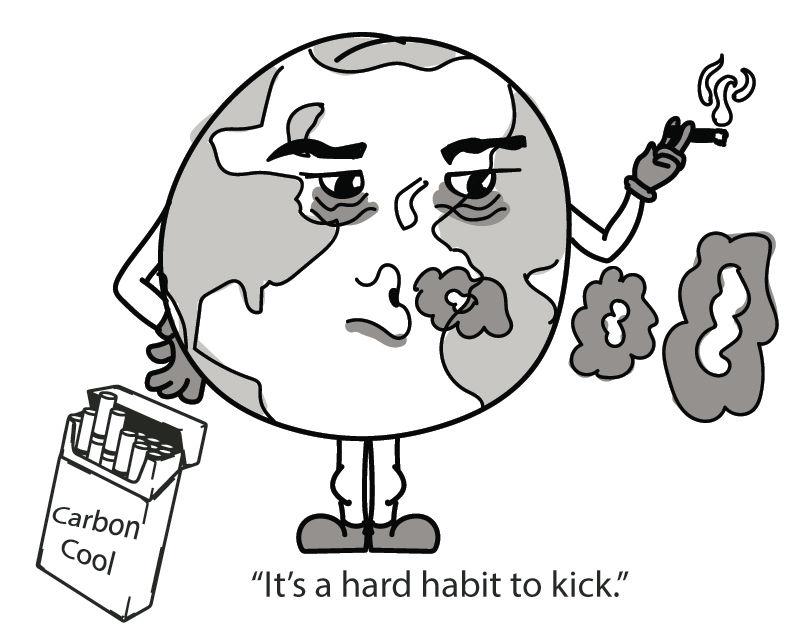How serious do you think the threat of climate change is? Have you actually looked at the reports or even followed the news regarding the impact?
I figure you either do not burden yourself with the thought or simply do not believe in climate change. As a college student, you have other things to worry about that seem more important than the state of our planet.
Convincing you to change your habits or become environmentally friendly is a waste of time. While nice to think about, your actions are a drop in the bucket compared to the dozens of companies actively destroying our future. All I am concerned with is getting you up to speed with the disturbing factors regarding this topic.
Fossil fuel companies have known about their harmful environmental impact for three decades. Geoffrey Supran, a Harvard University researcher, created a study and shared his findings with PBS.
ExxonMobil produced reports that outlined clear causation in academic and private sectors. Then, they spread disinformation to the public and their shareholders that claimed that the science was not settled, “no less than in ‘The New York Times.”
This deception, along with intensive lobbying, led to an increase in fossil fuel subsidies. The International Monetary Fund found overall subsidies for coal, oil and gas were $5.2 trillion worldwide in 2017. The U.S. reached $649 billion for these subsidies in 2015. For comparison, the government gave more money to fossil fuel companies in 2015 than the $598 billion spent on defense, according to the fiscal budget. If you consider the education budget was $70 billion in 2015, we gave over nine times that amount to fossil fuel companies.
Specific humans and companies keep screwing over the entire planet for money. Now, we are stuck with the impact that older generations lovingly passed on. Humans have already caused the Earth to warm between 0.8 and 1.2 degrees Celsius above pre-industrial levels since 1750. The rate of this warming is a direct result from human activity, primarily from emissions and pollution. Our global society causes a rise of 0.2 degrees Celsius every 10 years. At current rates, we should expect a change of 1.5 degrees Celsius between 2030 and 2050.
So, the Earth gets hotter. That seems like an easy fix with air conditioning, right? Unfortunately, any warming causes stress to human systems and the natural environment. Drought, unpredictable weather patterns and coastal storms like hurricanes will become harsher. We will also experience rising sea levels, ocean acidification and loss of coral habitats. According to the Guardian, even with our conservation efforts, we have lost half of all land animals since 1970. There are dozens of mortifying impacts that I cannot even cover in this article. Unfortunately, there is one more major issue that I need to bring up.
The goal of “12 years” tends to show up a lot when it comes to reducing the impact of climate change. Politicians and reporters throw this number around a lot. They claim that the results will become catastrophically irreversible if we refuse to act. That time frame itself is a lie. It comes from the 2018 IPCC report, created by the United Nations’ Intergovernmental Panel on Climate Change.
The report states, “The reduced complexity climate models employed in this assessment do not take into account permafrost or non-CO2 earth system feedbacks.”
Basically, this report leaves out important feedback loops to make the time frame less alarming.
Ice helps reflect sunlight and keeps the Earth cool. Ice melts when the Earth warms, which results in less reflected sunlight. When the ice re-freezes, the newer ice is not as reflective, and the Earth continues to warm faster. This runaway process is called a feedback loop.
Melting permafrost is an important feedback loop. It will become one of the largest contributors to carbon dioxide and methane. Permafrost is soil that has remained frozen for thousands of years. It is now starting to melt 70 years earlier than anticipated. According to the IPCC, that permafrost contains 5,300 to 5,600 gigatons of CO2. Thankfully, they expect only 5-15% to thaw, but that still equates to an alarming 265–795 gigatons. For comparison, humans have released roughly 1,500 gigatons of carbon in the last 250 years. Even in the best-case scenario, that permafrost releases 7-20 years of emissions.
The coming climate crisis brings complex and existential issues. We either change at an unprecedented scale or human society ceases to exist. As locations become uninhabitable, many will try to migrate. It also does not help that the human population is expected to rise 900 million by 2030. I wanted to end this article on a hopeful message, but I cannot sugarcoat this issue. If I did, I would only be adding on to the plethora of disinformation that surrounds this topic. Please register to vote and demand better results. Try to become more informed about this topic. You will face climate issues within your lifetime.























































































